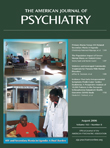Health Services Utilization in Jerusalem Under Terrorism
Abstract
Objective: The authors explored the effects of an escalation of terrorism on the help-seeking behavior of the general population in Jerusalem, a city that offers an adequate supply of medical and psychiatric services. Method: Time-series analyses were applied to examine the utilization of health services (primary medical care and ambulance calls) and mental health services (clinics, hospitals, and telephone hotlines) by Jerusalem residents before and during part of the current intifada. The authors assessed seasonality, general linear trends (from factors such as health education and increased access), short-term intifada impact (reflecting reactions that peaked at the third month and ended 1 year thereafter), and long-term impact (starting at the intifada outbreak and reflecting a more stable population behavior). Results: Adult psychiatric outpatient visits did not change except for the elderly in ongoing care who had both short- and long-term increases. The proportion of recorded ICD-10 diagnoses reflecting intifada-related reactions remained generally stable. Short-term effects included an increase in psychiatric readmissions. First contacts to substance abuse clinics remained unchanged. While long-term effects included a decrease in new psychiatric hospitalizations, the rate of monthly general practitioner visitors and the number of monthly ambulance and hotline calls increased. Conclusions: Except for the elderly and previously hospitalized persons, Jerusalem residents did not increase their use of psychiatric services but did increase their use of some other health services. These results suggest that this terrorism-affected population did not perceive their mental and social suffering as requiring specialized intervention.



